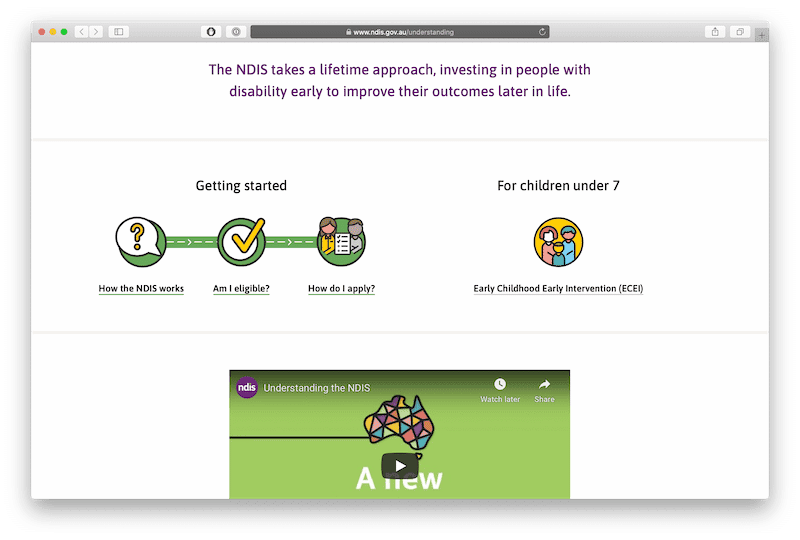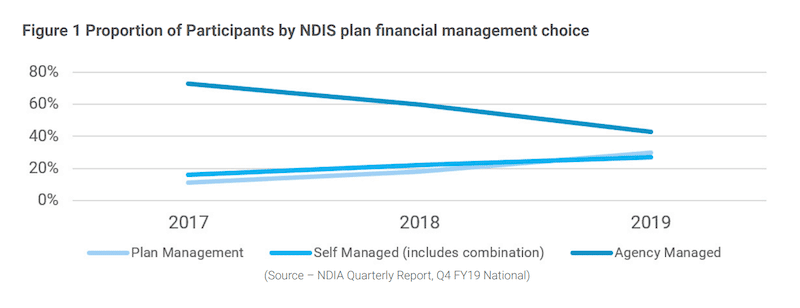
Unregistered vs. Registered: Pros & Cons for NDIS Providers
As a small care provider, switching to a registered NDIS regime can be a daunting process, often triggering a “fear” of regulations.
Because of this, many providers choose to stay unregistered, either postponing their registration or deliberately skipping it altogether.
Yet the word “unregistered” often has a negative connotation to participants, leading to trust issues and potentially driving important business away from your organisation.
So how do you go about tackling this problem?
There are pros and cons to both sides of the coin (registered vs unregistered) but the most important thing to remember is that your services should speak for themselves.
The issue with this naming convention is that “unregistered” providers are perceived as providing lower quality services when compared to registered NDIS providers.
But that reasoning couldn’t be farther from the truth…
Here’s a full breakdown on whether you should stay unregistered as a care provider or whether registration under the NDIS is something to consider for the near future.
A Brief Review of How The NDIS Works

Let’s get the basics out of the way first. The National Disability Insurance Scheme (NDIS) is a regulated “system” to provide disability care services in Australia.
You can think of it as the government asking small providers to compete against one another in a free-market-like environment to provide better services to people in need.
And guess what?
It works like a charm!
Under the NDIS, the financial incentive to provide quality services is much higher than previous regulations, and participant demand is growing based on this expectation.
So, everybody should get registered, right?
Yes and no…
The major hurdle with NDIS registration for small organisations is cost. As a registered NDIS care provider, there are a number of obligations you must commit to:
- Registration fees
- Verification and certification audits
- Administration costs (policies and procedures, bookkeeping, etc.)
… and more.
Many small providers often start as family or sole-proprietor businesses, meaning that—even with enough financial resources—getting the documentation ready in a timely manner becomes difficult without losing track of their main source of income.
This is the main reason why providers choose to stay “unregistered” but there should be no discernable difference in quality of service between the two—just legal status.
Registered vs. Unregistered NDIS Providers: What’s the Difference?
The key difference between the two is the legal status with the NDIA (an agency funded by the government to oversee the NDIS) and how it relates to your business.
There are a lot of reasons why registration is important:
- You can work directly with NDIA-managed participants, allowing for more business intake in your local area as well as expansion opportunities;
- Participants are keener on trusting registered NDIS providers rather than unregistered providers (even though quality of service should be similar);
- From a legal standpoint, you are fully-recognized as a provider committing to a certain standard of quality, allowing for easier access to financing, and;
- There’s no back and forth between the participant and the agency as you can request the funds from a participant’s plan directly through the NDIS portal.
These are just four of the “pros” of registering to the NDIS…
But there are also some considerations to make before registering as an NDIS provider, at least in the early days of your business venture, when cash flow tends to be slow:
- Registration and audits can be prohibitively expensive for small providers, potentially leading to poor ratings or a worsening of the services provided;
- Some participants deliberately prefer to work directly with their provider instead of the NDIA, making it easier to build a relationship with them;
- Prices aren’t subject to the limits within the NDIS price guide, meaning that smaller providers can offer competitive prices while staying profitable, and;
- While the NDIA recommends registering, operating as an unregistered provider is not illegal and can be done as long as the participant sees value in it.
Again, the landscape here isn’t as simple as “higher” or “lower” quality. There are many aspects you should consider before deciding whether to register or not…
To Register or Not To Register: Pros & Cons
At Brevity, our general recommendation is that you should always consider registering to the NDIS at some point, mainly because of the additional legal and business benefits.
However, there are times when it is okay not to register, especially if you operate in support categories which are fully allowed as unregistered providers by the NDIA.
Yes, this means that some supports are not allowed, namely:
- Specialist disability accommodation
- Supports or services during which there is or is likely to be a need to use a regulated restrictive practice
- Specialist behaviour supports that involve undertaking behaviour support assessment of the participant or developing a behaviour support plan for the participant.
It’s also important to understand the numbers behind participants’ financing methods before you go about choosing whether or not to register with the NDIS…
In 2019, the following percentages were observed:
- The lowest market share in terms of NDIS financing was in regards to self-managed plans, sitting at 27% (although the trend is going up at a steady pace each year);
- With the strongest growth trend year-over-year, plan-managed NDIS financing sat at around 30% in 2019, growing from just 11% in 2017, and;
- Finally, NDIA-managed plans hover around the 43% mark and are in steep decline thanks to the market maturing and plan managers becoming more proficient.
(Source: NDIA Quarterly Report)

Both current market share and growth trends are important considerations to make before choosing whether to register or not. While NDIA management is in decline, it still covers the majority of plans awarded to early participants.
With the maturing of the NDIS market, it makes sense that participants are relying more and more on plan managers providing peace of mind and hassle-free management.
For a complete recap of the pros and cons of registered/unregistered status with the NDIS, here’s a table to help you visualize the full picture and make an informed decision:
| TYPE | PROS | CONS |
|---|---|---|
| REGISTERED | – Access to NDIA-managed participants – Participants will see you as a trusted provider – The quality of service improves relative to the higher standards – Payments are handled directly through the NDIS portal for quicker cash flow – You can provide any type of service included in the support categories – In-depth documentation means a higher likelihood to receive financing – Reduces risk when policies are implemented correctly | – More paperwork to handle and higher costs – Less pricing flexibility and more competition – Maintaining operations becomes much harder for small businesses – The commitment to quality of service for participants becomes a legal matter – Not ideal for family businesses who want to stay small on purpose |
| UNREGISTERED | – Getting started is quick and requires minimal setup – Costs are related to the services provided only, no licensing or audit fees – You have a direct relationship with clients – Offering lower prices while maintaining profitability is easier to achieve – Ideal for local businesses which are highly integrated with their communities | – Participants are wary of working with unregistered providers (trust issues) – Building a reputation requires more effort – You can’t benefit from NDIA-provided lists – There’s not much room for scaling your business – No documentation leaves you vulnerable to more liabilities and legalities – You still have to apply NDIS principles when working with funded participants – No auditing from the Quality and Safeguards Commission could lead to lower quality or commitment in the long-term |
Best Practices To Follow for Unregistered NDIS Providers
If you still prefer not to register to the NDIS after careful consideration, you should apply a few best practices even if you don’t carry the legal status:
- Get an Australian Business Number (ABN). Even if unregistered, you are still operating as a business and will need the ABN for all invoicing.
- The NDIS Code of Conduct still applies if you provide services to a participant who receives funding from the NDIA. The importance of this cannot be overstated.
- While you have no obligation to meet the quality standards requested by the NDIS Quality and Safeguards Commission, self-managing participants may ask for a worker screening check depending on the type of service you provide.
- While pricing is more flexible as an unregistered provider, offering anti-competitive prices will lead to serious legal issues and may contribute to ceasing of business operations. Unregistered doesn’t mean unregulated.
- Due to lack of in-depth documentation, operating as an unregistered provider leaves you vulnerable to unexpected liabilities. Business insurance is key.
- Just like any other business (and especially in the disability care industry), complaints should be handled professionally and in a timely manner. Disregarding them means refusing to abide by the NDIS Code of Conduct and neglecting the clients’ struggles as a person with special needs.
With these best practices in mind, operating as an unregistered provider is by all means feasible and worth it, especially for businesses who want to stay small on purpose.
Building a Strong Relationship with NDIS Participants

Whatever you end up choosing, building a long-lasting relationship with participants looking for comfort in your care services should be your priority.
Both unregistered and registered NDIS providers can offer stellar service for the right prices and reasons. It’s that level of commitment that truly matters in this industry.
Our recommendation is to always consider switching to registered status, not only because of the business benefits but also because of a stronger commitment.
While the NDIS registration process can be cumbersome at times, setting up the proper documentation helps in guiding the quality of your services forward.
The results of registration are:
- a participant that trusts your business for the long-term instead of questioning whether the quality is up to par, and;
- a stronger business with fewer liabilities.
There’s no “right” or “wrong” way to go about it.
Based on the information provided in this article (and careful market share considerations), the choice is fully yours to make.
Originally published Sep 18, 2020
Frequently Asked Questions
The National Disability Insurance Scheme (NDIS) offers providers a “system” to keep track of the quality of their services and compete in a free-market-like environment where financial incentives lead to a better overall experience for the participant.
Yes, this is an absolute requirement even for small, unregistered service providers. Providing care services without an ABN is an unnecessary liability that can potentially lead to serious legal action against your business practices.
Many small providers choose to stay unregistered because of the cost of registration: admission fees, audits, administrative tasks, and so on. The core difference is in the legal status (registered providers have more obligations but are also more likely to grow financially) but, to be clear, operating as an unregistered provider is NOT illegal and can be done as long as the participant sees value in it and is happy with the services.
To “become” an unregistered NDIS provider, you simply operate your business using an ABN for the disability care industry and invoice participants directly. How you onboard new clients is another story since it’s usually easier to do so as a registered provider.



